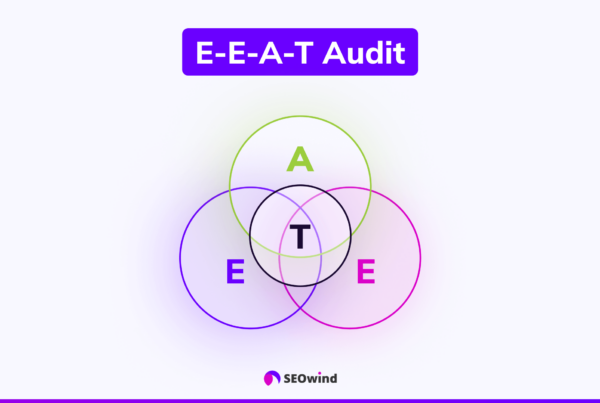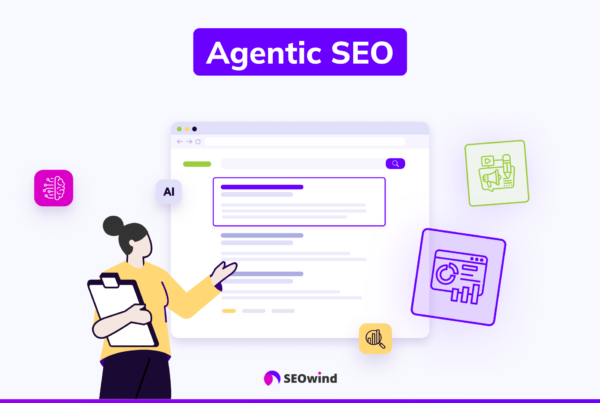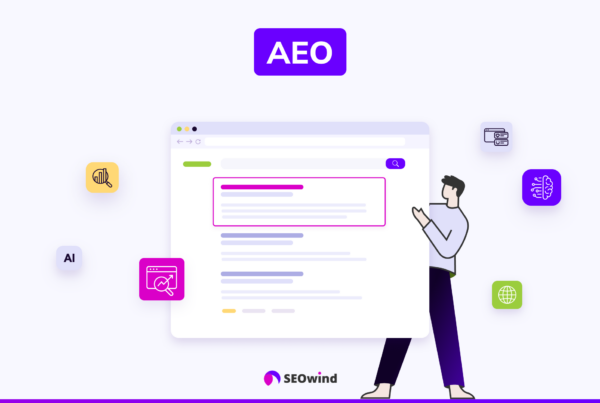Ever wondered how to get ahead in the competitive world of digital marketing? Enter Artificial Intelligence (AI) marketing — an innovative approach combining technology and deep learning to transform how marketers reach and engage with their consumers. As one of the most groundbreaking developments in recent years, it’s high time businesses catch up with this trend and adopt AI-driven strategies to excel in an ever-changing industry. So strap in because in this comprehensive guide, I will walk you through everything you need to know about AI marketing — from understanding the basics, why you should use it, how to get started, and so much more.
What is AI (Artificial Intelligence) Marketing?
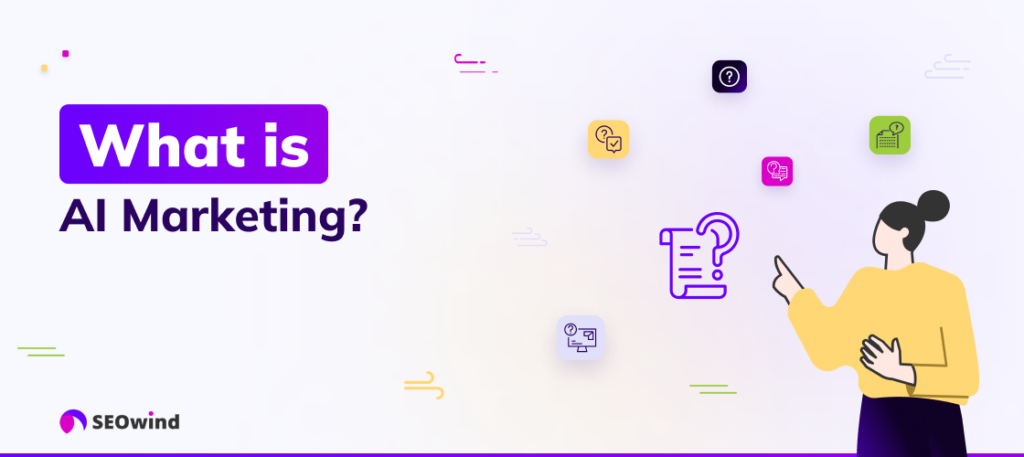
AI marketing harnesses data points and advanced tools such as machine learning algorithms to analyze consumer behavior better and create personalized offers tailored for each customer. By leveraging artificial intelligence technologies, marketers can enhance their decision-making capabilities and build more effective campaigns to meet business goals efficiently.
Overview of AI Marketing
The primary objective of AI marketing lies in automating specific processes within a campaign while improving existing ones. The heart of these solutions is predictive analytics – enabling marketers to accurately forecast trends, audience preferences, and potential conversions based on historical data patterns. Furthermore, by automating repetitive tasks such as content generation or programmatic media buying, brands can save time while improving overall efficiency.
In short:
- Employs cutting-edge technology like machine learning
- Analyzes consumer behavior more effectively
- Automates various elements within a marketing campaigns
- Leverages predictive analytics for informed decisions
- Increases efficiency by saving manual task hours
15 Actionable Tips to use AI in your marketing
Ready to AI-amplify your marketing with AI? We have 15 actionable tactics prepared for you!
10+ Use Cases for AI Marketing
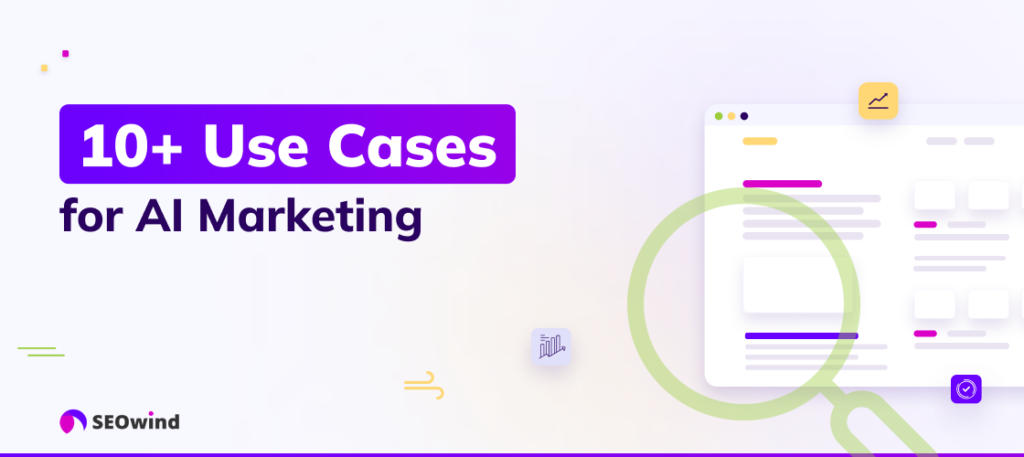
AI marketing solutions are transforming the way marketers reach and engage their audiences. Here, we explore over ten areas where AI significantly impacts marketing campaigns and strategies.
Social media listening
AI-powered social media listening tools enable marketers to track and analyze various social platforms’ activities. These tools use natural language processing (NLP) techniques to understand consumer sentiment better, allowing businesses to respond proactively based on trends and audience preferences.
Content generation
Content creation can be time-consuming for marketers. AI-based content generation tools like ChtaGPT can quickly produce unique and relevant material. Content AI Tools cover simple copywriting such as developing catchy headlines and engaging copy using natural language processing (NLP), and more complex like writing comprehensive long-form articles and blog posts.
Automation
AI-powered automation streamlines several marketing processes, such as scheduling social media posts or triggering personalized emails based on user behavior. Artificial intelligence ensures that routines work seamlessly while making it easier for marketers to save time and focus on strategic initiatives.
Bidding on Programmatic Media Buys
Programmatic advertising uses algorithms to assess ad inventory’s value automatically before placing bids in real-time auctions. With machine learning capabilities, these algorithms become more intelligent by evaluating past campaign performance data, resulting in more efficient ad-buying decisions.
Audience segmentation and personalization
Machine learning algorithms can identify patterns within customer databases, enabling marketers to segment their audiences into meaningful groups effectively. Furthermore, with AI-fueled recommendation engines, businesses can offer targeted products or services that cater explicitly to user interests — optimizing customer experiences at each interaction point.
Chatbots and Conversational Experiences
Chatbots have revolutionized customer support and communication. Powered by AI, these intelligent virtual assistants understand natural language inputs to help address service issues and assist in sales conversions efficiently ─ enabling businesses with lag-free 24/7 customer service experience and engagement.
Select the Right Message
AI-driven marketing provides adaptive messaging by using historical customer data to deliver hyper-personalized content throughout various touchpoints in the buyer journey. Tailoring communication to individual customers’ needs and preferences amplifies engagement leading to increased conversion rates.
Predictive Marketing Analytics
Predictive analytics use AI to analyze vast quantities of data, making it possible for marketers to forecast consumer behavior better. This capacity empowers marketing teams to devise strategic campaigns that target the right customer segments, ensuring a higher ROI on their marketing investments.
Data analysis for customer insights
AI-based data analysis tools are invaluable for gathering vital marketing insights from vast datasets. By identifying correlations and trends across customer interactions, marketers can make informed decisions on improving their campaigns, ultimately enhancing user engagement.
Marketing Operations
AI-driven solutions streamline marketing operations, such as budget allocation, campaign planning, and project management. With machine learning algorithms predicting campaign performance, marketing teams can optimize budgets effectively while deploying resources efficiently throughout large-scale projects.
Dynamic Pricing
Dynamic pricing allows businesses to adjust pricing strategies based on real-time demand surges or declines in inventory levels. Utilizing AI-generated predictions ensures brands remain competitive without forfeiting potential revenue spurred by market fluctuations.
Multilingual advantage
With increasingly global markets at hand, communicating effectively across various languages has become increasingly important. AI-powered translation tools offer near-instant translations of content into multiple languages while retaining context─ helping marketers reach a broader audience adeptly.
These are just a taste of artificial intelligence’s myriad possibilities when applied creatively within a company’s marketing initiatives. As we delve deeper into this exciting realm throughout this article, you’ll uncover various solutions tailor-made to suit your unique marketing needs while staying ahead of the competition curve in today’s ever-evolving digital landscape.
Benefits of Leveraging Artificial Intelligence Marketing Tools?
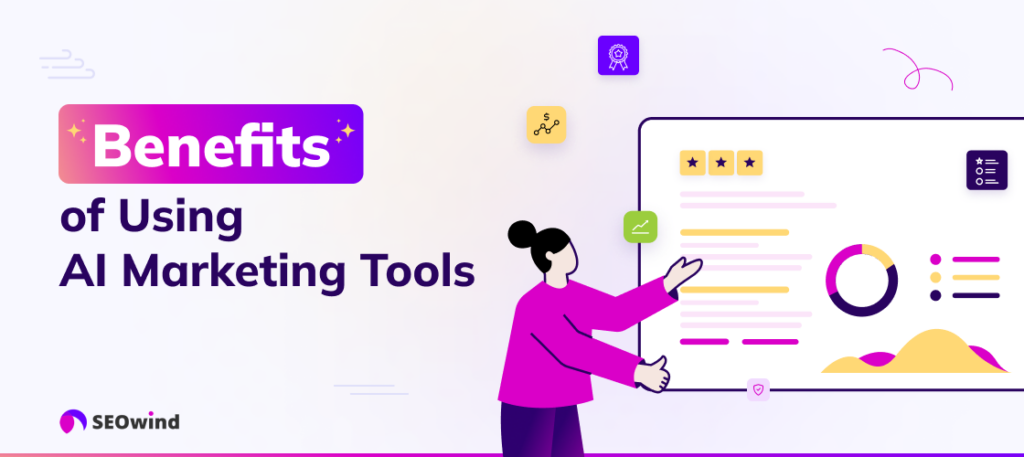
Increased Campaign ROI
One of the key reasons companies opt for AI-driven marketing programs is its potential to increase campaign return on investment (ROI) significantly. By incorporating AI into your marketing strategy, you can:
- Identify high-value target audiences more precisely.
- Deliver personalized content based on real-time data.
- Improve customer engagement by predicting and reacting to consumer behavior changes.
- Optimize ad spend by using dynamic pricing models.
These data-driven capabilities result in cost-effective, highly targeted campaigns that lead to an impressive surge in your overall ROI.
Better Customer Relationships & Real-Time Personalization
AI marketing tools enable a deeper understanding of customer preferences and behaviors. This knowledge allows for real-time personalization, enhancing user experience, and strengthening customer relationships. Leveraging artificial intelligence for these purposes includes:
- Analyzing large volumes of customer data quickly and extracting valuable insights.
- Predictive analytics to better understand customers’ needs and preferences.
- Using machine learning algorithms for personalized product recommendations or promotions tailored to individual users.
- Utilizing natural language processing for sentiment analysis in social media monitoring or chatbots, offering empathetic responses to customers’ concerns.
As a result, customers receive relevant content catered explicitly to them, encouraging repeat visits, boosting conversions, and fostering loyalty.
Enhanced Marketing Measurement
Marketing measurement plays an essential role when assessing campaign effectiveness. With traditional analytical methods requiring significant time investments with limited accuracy of results, AI solutions bring about drastic improvement in this area:
- Developing advanced attribution models to determine the impact of various touchpoints throughout the buyer’s journey.
- Offering predictive analytics that forecast campaign outcomes rather than providing simple performance analysis.
- Using machine learning to refine models and algorithms over time as data accumulates results in increasingly accurate predictions.
With AI-powered marketing measurements, marketers can comprehend their strategies’ impact easily and promptly and make informed, more data-driven decisions.
Make Decisions Faster
The vast information available in the digital era can lead to decision paralysis. Artificial intelligence aids marketers by simplifying decision-making through:
- Analyzing multitudes of existing and real-time data swiftly and accurately
- Uncovering customer trends or emerging problems quickly
- Providing actionable insights for prompt adjustments to strategies
Enhanced Automation Capabilities
Many marketing tasks require repetitive actions that can be time-consuming when managed manually. Utilizing AI-enabled marketing automation systems streamlines these repetitive processes while maintaining efficiency and accuracy. For instance, automated email campaigns triggered based on user behavior or chatbots handling basic support inquiries are examples of effective automation.
Adaptability & Scalability
Artificial Intelligence technologies continually evolve and can learn from vast datasets over time. As a result, businesses using such solutions will benefit from an ever-improving system capable of offering increasingly accurate predictions and suggestions. Moreover, these advanced algorithms often scale quickly within growing organizations without affecting performance levels or requiring substantial adjustments.
In light of these compelling advantages, it becomes evident that incorporating AI-powered marketing tools into your strategic toolkit is invaluable for achieving sustainable success in an increasingly dynamic and competitive digital landscape.
Types of AI Marketing Solutions
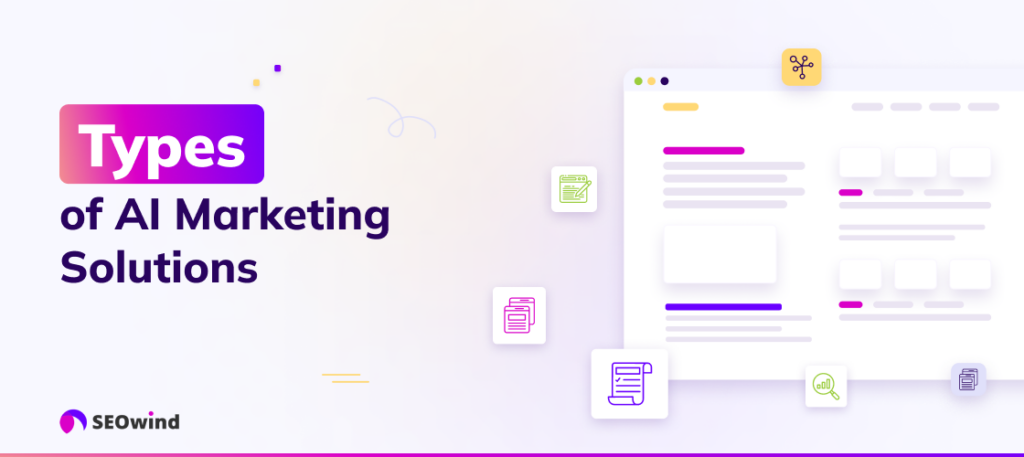
AI marketing solutions come in various forms, designed to help businesses improve their efficiency and decision-making processes. This section will discuss three significant types of AI marketing solutions: Machine Learning, Big Data and Analytics, and AI Marketing Tools & Platforms.
Machine Learning
Machine learning is a subset of artificial intelligence that focuses on developing algorithms to enable computers to learn from data and make predictions or perform tasks without explicit programming. In the context of marketing, machine learning can be used for:
- Analyzing customer behavior patterns to create personalized content and offers.
- Predicting customer churn, enabling businesses to take proactive steps towards retention.
- Optimizing advertisements by analyzing ad performance and adjusting bids automatically.
- Increasing email open rates through subject line optimization based on recipient engagement patterns.
Leveraging machine learning in your marketing efforts empowers you with intelligent insights derived from real-time data processing, improving your ability to serve customers’ needs effectively.
Big Data and Analytics
Big data refers to large volumes of structured and unstructured data generated at high velocity from diverse sources such as social media, websites, or IoT devices. The power of incorporating big data analytics into marketing lies in its ability to unveil hidden trends, correlations, or emerging consumer preferences otherwise not apparent through conventional methods.
Some applications of big data analytics in marketing include:
- Sentiment analysis: Understanding the sentiment behind online conversations around a brand or product helps marketers tailor communication strategies accordingly.
- Market segmentation: Identifying target markets based on demographic variables such as location, age group, or interests enables targeted advertising campaigns.
- Trend identification: Uncovering new trends within consumer niches creates opportunities for product development or sales promotions.
- A/B testing: Informing decisions regarding elements like layouts, copywriting styles, or color schemes based on multivariate statistical analyses significantly increases conversion rate optimization probabilities.
Integrating big data and analytics into AI marketing solutions significantly enriches decision-making processes, leading to better outcomes.
AI Marketing Tools & Platforms
Various AI marketing platforms and tools are available for businesses ready to harness artificial intelligence’s benefits in their marketing efforts. These platforms offer a range of features and capabilities, allowing marketers to access powerful insights, automate repetitive tasks, and optimize campaign performance effectively.
Some popular AI tools include:
- SEOwind (Content Generation): SEOwind is an AI marketing tool that creates comprehensive, long-form articles and blog posts in minutes. Its content is based on thorough content and keyword research.
- Brandwatch (Social Media Listening): Brandwatch is an AI-powered social media listening tool that helps businesses gain insights into consumer opinion, track and manage brand reputation, and analyze data from social networks to make informed decisions.
- SproutSocial (Social Media Listening): SproutSocial is an advanced social media management and listening platform that offers real-time monitoring of brand-related conversations, enabling businesses to understand and engage with their audience effectively.
- Phrasee (Content Generation): Phrasee uses AI and NLP technology to create compelling marketing copy, headlines, and email subject lines tailored to a brand’s voice, tone, and style, helping businesses communicate more effectively with their audience.
- Articoolo (Content Generation): Articoolo is an AI marketing tool designed for creating high-quality articles, blog posts, and other written content in minutes, saving marketers time and resources.
- ActiveCampaign (Automation): ActiveCampaign is an AI-driven marketing automation platform that helps businesses optimize email campaigns, social media scheduling, and ad placements, streamlining time-sensitive decision-making processes.
- MarketMuse (Automation): MarketMuse is an AI-powered content marketing and automation platform that streamlines content creation, optimization, and strategy, helping marketers efficiently reach their target audience.
- The Trade Desk (Bidding on Programmatic Media Buys): The Trade Desk is a leading AI-powered advertising platform that automates real-time bidding processes, allowing marketers to target relevant ad spaces and reach appropriate audiences efficiently.
- Adobe Advertising Cloud (Bidding on Programmatic Media Buys): Adobe Advertising Cloud is an AI-driven platform that simplifies programmatic media buying, enabling marketers to automate ad bidding and placement to maximize advertising returns.
- Optimizely (Audience Segmentation & Personalization): Optimizely uses AI and machine learning to analyze user behavior, allowing marketers to create finely-tuned audience segments and deliver personalized content for improved engagement and conversion rates.
- Dynamic Yield (Audience Segmentation & Personalization): Dynamic Yield is an AI-powered personalization platform that combines user behavioral data and machine learning tools to offer highly targeted ads and personalized content, ultimately increasing conversion rates and customer satisfaction.
- Drift (Chatbots & Conversational Experiences): Drift is an AI-enabled conversational marketing platform that provides instant assistance and support to customers through chatbots, improving their overall experience and increasing engagement.
- Intercom (Chatbots & Conversational Experiences): Intercom is an AI-driven customer messaging platform that helps businesses create personalized chatbot experiences, streamlining customer support, and enhancing user engagement with real-time, contextually relevant conversations.
Adopting the appropriate balance of machine learning techniques, big data analytics applications, and industry-specific AI marketing platforms will enable marketers to deliver exceptional results in today’s competitive landscape.
Challenges for AI Marketing
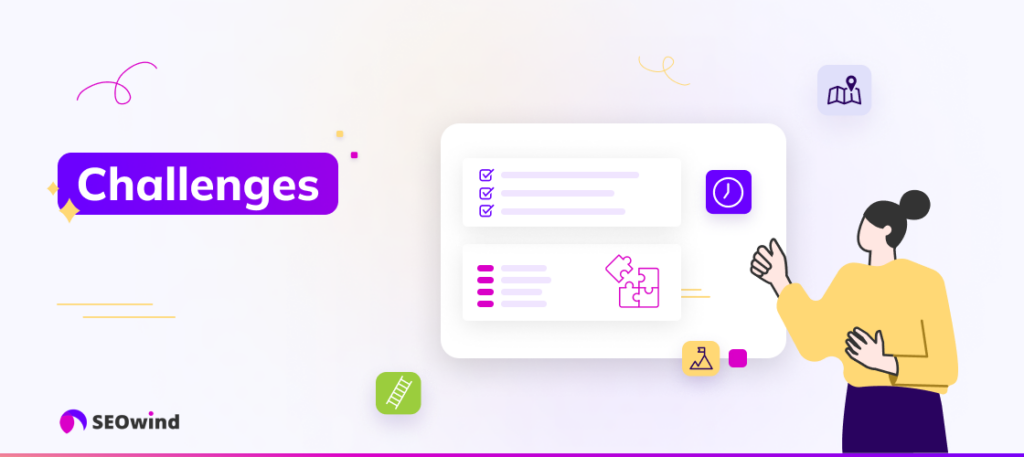
As with any emerging technology, there are challenges that organizations face while adopting AI in marketing. These challenges can range from training time and data quality to privacy concerns and the need for buy-in from stakeholders. Let’s delve into these challenges in detail.
Training Time and Data Quality
One significant challenge of AI marketing is the time required to train AI algorithms and ensure data quality properly. The effectiveness of an AI-driven marketing strategy largely depends on the data you input into these systems. Investing in collecting, storing, and preprocessing accurate and up-to-date information is crucial.
- Collect high-quality data: Your AI marketing tools are only as good as the underlying data they work with.
- Continuously update your database: Ensure you’re working with fresh insights by frequently updating your consumer databases.
- Preprocess and clean raw data effectively: Eliminate anomalies or inaccuracies in your dataset to enhance algorithm efficiency.
Privacy
Another concern when implementing AI marketing strategies is privacy regulations such as GDPR (General Data Protection Regulation) or California Consumer Privacy Act (CCPA). To comply, you must adhere to specific guidelines governing how customer data, including personal information, is collected, stored, processed, and shared.
Here are a few tips on addressing privacy concerns:
- Keep updated on existing laws and regulations related to customer data usage.
- Store sensitive user information securely.
- Implement appropriate controls for sharing user data.
Getting Buy-In
AI adoption may also require overcoming resistance or skepticism from decision-makers. Often they need more clarity about the benefits of using this technology in their digital marketing initiatives. Investing in an effective change management process can help counter this hurdle by:
- Communicating the rationale behind adopting AI solutions.
- Demonstrating successful case studies where companies have successfully used AI in their marketing campaigns
- Pilot projects: Test AI platforms internally before expanding deployment across other areas within the organization
Deployment Best Practices
Implementing AI-driven marketing strategies entails simple task automation transitioning from manual processes to automated ones. To ensure a smooth deployment, there are several best practices to consider:
- Define clear goals and objectives: Determine what you want to achieve using AI tools for better planning and decision-making.
- Appoint an AI project manager: Designate someone responsible for overseeing implementation, troubleshooting, and monitoring progress.
- Provide adequate resources: Allocate sufficient budget and workforce for successfully adopting AI solutions.
- Train employees on AI platforms: Ensure relevant teams undergo comprehensive training on leveraging these technologies effectively.
Adapting to a Changing Digital Marketing Landscape
AI technology continues to evolve rapidly, so organizations must keep up with the latest developments and adapt their strategies continually. This dynamism demands continuous learning by marketers as they frequently adjust strategies with new market trends.
To future-proof your AI marketing plan:
- Stay updated on industry trends.
- Attend conferences or seminars related to AI-powered marketing.
- Participate in knowledge-sharing forums for early access to emerging innovations.
- Maintain flexibility in your strategy by incorporating feedback loops for iterative adjustments.
How to Use AI in Marketing
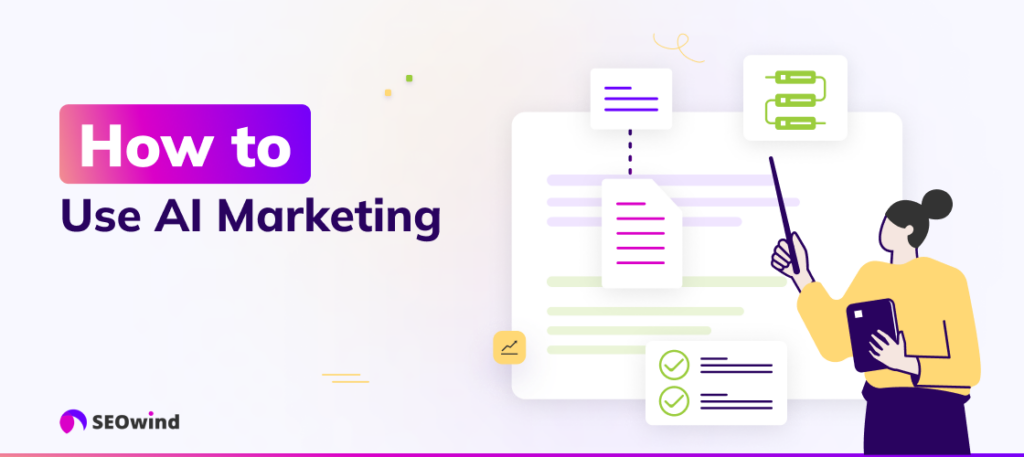
To start with AI marketing, it is crucial to devise a practical approach. By following these steps, businesses can integrate AI-driven solutions into their marketing strategies and unlock their full potential.
Establish Goals
Before implementing any AI marketing tools, you must identify the specific objectives you hope to achieve. Examples of goals include improving conversion rates, enhancing customer segmentation, automating content generation, or optimizing advertising spend. Once your goals are stated explicitly, choosing the most relevant AI marketing solutions for your business needs becomes easier.
Data Privacy Standards
Ensuring data privacy should be a top priority when using AI in digital marketing campaigns. Organizations must adhere to regulatory standards such as the General Data Protection Regulation (GDPR) and other industry-specific guidelines. Establishing robust data privacy policies and practices within your organization will strengthen credibility and trust among customers while minimizing legal compliance risks.
Data Quantity and Sources
AI tools require vast amounts of high-quality data to produce valuable insights and results. Determine which types of data your organization collects and analyze whether those sources offer enough information for your intended goal(s). If necessary, consider supplementing internal data with external resources like social media feeds or third-party databases. Make sure all sources meet ethical standards and respect user privacy.
Acquire Data Science Talent
Having knowledgeable staff members who understand digital marketing and artificial intelligence concepts is crucial for successfully integrating AI solutions. Hire or train professionals with the necessary skills in machine learning algorithms, big data analytics, natural language processing (NLP), sentiment analysis, etc. These experts will help leverage AI capabilities efficiently across your marketing strategy.
Maintain Data Quality
Data quality plays a significant role in achieving accurate results from any implemented AI toolset. Therefore, consciously maintaining this factor is vital. Establish ongoing processes that ensure collected data remains clean by removing duplicates, filling in missing values, and eliminating inaccuracies. Implement procedures to monitor data quality continuously and make necessary adjustments if discrepancies arise.
Create an Integrated AI Marketing Strategy
Finally, develop a comprehensive plan that outlines how all identified AI marketing solutions will seamlessly integrate with your existing marketing strategy. Ensure relevant stakeholders know the short-term and long-term benefits of these AI-powered tools, which may result in resource allocation shifts or allocation of responsibilities across teams. Integrating your chosen AI solutions cohesively within current strategies allows for streamlined processes, increased efficiency, and, ultimately, better results for your organization.
Selecting an AI Platform
A well-picked AI marketing platform can positively impact your campaigns and enhance efficiency. Here are some key factors to consider that can help you make an informed decision when selecting an AI platform for your marketing needs.
Align with Business Objectives
Before searching for the perfect platform, clearly define your business objectives. Evaluate which areas in your marketing could benefit from the introduction of ai-driven solutions such as campaign optimization, automation, data collection, and analysis, or audience segmentation. Understanding specific pain points will enable you to select a suitable AI marketing tool to address those issues and bring measurable improvements.
Compatibility with Existing Tools
One essential element in ensuring the AI platform integrates seamlessly into your existing marketing infrastructure is compatibility with tech stacks already in use. Assess if potential tools offer easy integration with platforms like CRM systems, analytics software, and content management platforms or require extensive customizations that might slow adoption.
User-Friendliness
The learning curve of implementing new technology should be noticed. Using AI marketing tools shouldn’t feel convoluted – they must be user-friendly and provide intuitive interfaces reducing onboarding time for team members while boosting productivity efficiently.
Scalability & Customization
As businesses grow and evolve, scalability becomes vital. Opt for platforms that offer flexibility in pricing plans based on usage and performance levels – do not pay more than what you’re currently using or hinder access to functionalities relevant to growth areas within possible expansion scenarios down the line.
Ensure customization options let you adapt features according to specific organizations’ requirements so that bespoke implementations align tightly with unique workflows without limiting overall output capacity only by pre-set feature sets within given applications.
Security & Compliance Considerations
Data security must always be a priority when working with sensitive customer information and industry-specific regulatory guidelines (such as GDPR). Prioritize platforms that follow robust data protection measures, ensuring the privacy of your customers’ information and compliance with all applicable legislation.
Vendor Reputation & Support
Evaluate potential AI marketing platform vendors based on their reputation, experience working within your industry, proven success stories, and readily available customer reviews or testimonials. Check if they provide a high level of support during implementation and after deployment, including training resources, customer service assistance, and regular updates to software feature sets explicitly designed for resolving common hurdles faced by users across domains linked closely with product utilization patterns under different situations within an organization’s operations lifecycle.
AI Marketing Predictions and Trends
As AI in marketing continues to evolve, several emerging trends and predictions are poised to shape the future of this rapidly growing field. In this section, we will discuss some significant developments that marketers should remain aware of as they implement AI in their marketing strategies.
Widespread Adoption of Business Automation
AI technology is expected to be increasingly integrated into businesses across various sectors, leading to the widespread adoption of automation techniques. AI-driven solutions like chatbots, content generation programs, and data analysis tools would replace time-consuming manual processes, allowing digital marketers to focus on more strategic activities.
Voice search optimization alongside visual search advancements
The popularity of voice-activated devices such as Amazon’s Echo and Google Home continues to rise. Consequently, businesses must also adapt their digital marketing efforts for voice search optimization (VSO), crafting engaging conversational experiences tailored for these platforms. Simultaneously, advances in visual search technology powered by computer vision techniques can profoundly affect consumer behavior and ad targeting capabilities.
Enhanced Personalization through Big Data
With artificial intelligence algorithms, marketers will enjoy unprecedented real-time access to large-scale data analysis. This increased accuracy in understanding customer preferences ensures that brands can develop hyper-personalized marketing content – from product recommendations to targeted advertising – allowing companies to create stronger connections with their target audience.
The Rise of Ethical AI Considerations
A growing concern among consumers regarding data privacy will drive businesses and governments toward adopting stringent ethical guidelines surrounding AI usage. Marketers must respect user privacy while complying with international legislation that safeguards customer information, like GDPR and the California Consumer Privacy Act (CCPA).
Cross-Border Marketing Collaboration
The prominence of digital interconnectivity in today’s business paves the way for cross-border collaboration among marketing teams utilizing AI-based solutions. Marketers need collaborative platforms, translation services, and trend analysis to communicate globally.
Custom AI Solutions and Platforms
As the demand for AI marketing solutions surges, there will be an inevitable shift towards creating bespoke algorithms explicitly tailored to the unique needs of individual businesses. This customization aspect would enable organizations to cater effectively to their niche audience while ensuring a competitive edge against other market players.
In conclusion, staying on top of these developing trends and predictions is essential for any marketer looking to stay ahead in the ever-changing world of AI-powered marketing. By leveraging these insights, companies can ensure they adopt the most suitable strategies and create maximum value when integrating artificial intelligence into their operations.
Is AI Marketing Legit?

AI marketing has proven a powerful and practical asset for businesses worldwide. As technology advances, many companies adopt artificial intelligence (AI) to improve their marketing strategies and maximize the return on investment (ROI). However, as with any technological advancement, skepticism is natural, and some might question the legitimacy of AI marketing. This section will explore the various aspects affirming AI marketing as a legitimate business tool.
Credible Success Stories
There are numerous success stories in which companies have achieved tangible results by implementing AI in their marketing strategies. For instance,
- Netflix employed AI algorithms to personalize content recommendations for millions of users, significantly increasing user engagement.
- Starbucks utilized predictive analytics to deliver customized offers based on a customer’s purchasing history and preferences.
- The North Face implemented IBM’s Watson-powered chatbot platform to create personalized shopping experiences for website visitors.
These examples demonstrate the effectiveness of AI-powered marketing tactics when executed correctly, further strengthening its credibility.
Research Support & Adoption By Industry Leaders
In addition to real-world applications, several research studies have shown positive correlations between employing AI solutions in marketing practices and enhanced overall performance. A report by PWC suggests that by 2030, nearly 38 percent of U.S. jobs could be automated using current technologies. Furthermore, Gartner predicts that global business value derived from artificial intelligence will reach $1.2 trillion in 2020 – a whopping 70% increase from 2017.
The adoption of AI technology by industry leaders like Google, Amazon, and Apple reflects its potential to streamline operations and drive growth across various sectors.
Regulatory Frameworks
As governments worldwide become more aware of AI’s potential impact on society and industry, they are developing comprehensive regulatory frameworks. These regulations focus primarily on ensuring ethical use cases for artificial intelligence while leveraging its benefits.
For example, the European Union has released guidelines surrounding the ethical development of AI, including transparency and accountability. Similarly, the United States has implemented guidelines on AI usage by federal agencies.
The existence of regulatory frameworks indicates that governing bodies recognize the legitimacy and potential value offered by AI technologies, including marketing applications.
Constant Technological Advancements
In recent years, significant improvements have been made to artificial intelligence capabilities. Machine Learning algorithms are now more accessible than ever, thanks to open-source resources and growing technological investments. This continuous progress reflects market demand and confidence in AI solutions – consolidating its credibility among professionals worldwide.
Moreover, developments in natural language processing (NLP) and computer vision empower marketing teams with innovative tools to effectively cater to diverse customer segments.
Considering these factors – credible success stories, endorsement by industry leaders & research organizations, regulatory frameworks supporting the ethical use of technology, and constant advancements – it is safe to conclude that AI Marketing is legitimate. By leveraging AI-powered solutions strategically, businesses can unlock new avenues for growth while maintaining a competitive edge in today’s dynamic landscape.
